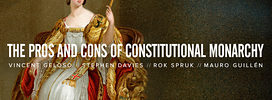Lead Essay
Why keep a monarchy that’s largely or purely ceremonial? One possible answer is that a ceremonial monarch is much better than a real tyrant. More to the point, where monarchy has survived, it has commonly been by adapting itself successfully to the rise of liberal democracy. Thus, while we should neither create new monarchies nor expand the powers of existing ones, Prof. Geloso argues that constitutional monarchs have paradoxically produced effective constraints on governance over time.
Response Essays
Of the 43 monarchies in the world, 23 are among the 50 richest countries. Contrary to their reputation, they show high levels of economic equality and income per capita. Mauro F. Guillén argues that this is because “the constitutional monarchy represents a compromise between tradition and modernity” and “a beautiful solution to a wide array of governance problems.” He finds it particularly important that monarchs act as a check on the otherwise boundless ambition of elected executives.
Stephen Davies argues that monarchy fulfills one of the key functions of government, which moderns are apt to overlook. Monarchies are symbolically unifying, and—as long as we must have a head of state—a monarch fills that role while serving as a symbolic and relatively apolitical link to the past and the future of the nation.
Rok Spruk argues that proponents of constitutional monarchy have reversed the causality: Countries that began the modern era relatively wealthy were more likely to keep their monarchies over time than those that did not. Because wealthier countries could keep their institutions, their monarchies came along for the ride. Those that suffered wars or revolutions were also more often forced to reconsider their systems of government, monarchies included.
Coming Up
Conversation through the end of the month.

